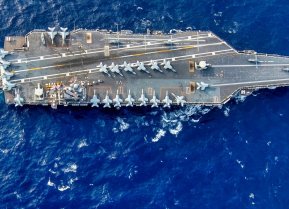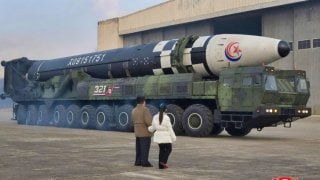Halfway Deal: How Joe Biden Can Cap North Korea's Nuclear Weapons Program
The most sensible approach would be to propose a halfway deal with Kim. Such an agreement would cap the size of his nuclear arsenal by verifiably dismantling North Korean nuclear production facilities while also instituting bans on nuclear and long-range missile testing in exchange for a partial lifting of sanctions on North Korea (with “snapback provisions” in the event of North Korean violations of its obligations).
The Biden administration has done a generally good job in managing the U.S.-South Korean alliance and also in tightening links between that bilateral relationship and the U.S.-Japan alliance.
The August 2023 Camp David summit of the leaders of Japan, the United States, and the Republic of Korea was a reflection and further reinforcement of this desirable trend.
Yet there is to my mind one mistake in the Biden team’s approach to this part of the world: as I’ve previously argued, the Biden administration seems content to tell Kim Jong-un that the United States will negotiate anytime he wishes, but to leave the content of any such possible talks a mystery, hoping that Kim will want dialogue for its own sake.
Instead, I believe the Biden team should make greater efforts on this diplomatic track.
What a Biden - North Korea Deal Could Look Like
The most sensible approach would be to propose a halfway deal with Kim. Such an agreement would cap the size of his nuclear arsenal by verifiably dismantling North Korean nuclear production facilities while also instituting bans on nuclear and long-range missile testing in exchange for a partial lifting of sanctions on North Korea (with “snapback provisions” in the event of North Korean violations of its obligations).
The dismantlement of North Korea’s existing nuclear weapons would be left for another day.
This approach would not recognize and accept the existing North Korean nuclear arsenal any more than does current policy, despite that policy’s declared (but currently magical and unrealistic) intent of complete and irreversible North Korean denuclearization.
Admittedly, the immediate prospects for such a deal appear modest, given Kim’s attachment to his military modernization programs.
But the main parameters of a deal should nonetheless be articulated, partly as a way of maintaining as much cooperation with China on the issue as possible.
About the Author
Dr. Michael E. O’Hanlon is a senior fellow and director of research in Foreign Policy at the Brookings Institution, where he specializes in U.S. defense strategy, the use of military force, and American national security policy. He directs the Strobe Talbott Center on Security, Strategy and Technology, as well as the Defense Industrial Base working group, and is the inaugural holder of the Philip H. Knight Chair in Defense and Strategy. He co-directs the Africa Security Initiative as well. He is an adjunct professor at Columbia, Georgetown, and George Washington universities, and a member of the International Institute for Strategic Studies.


